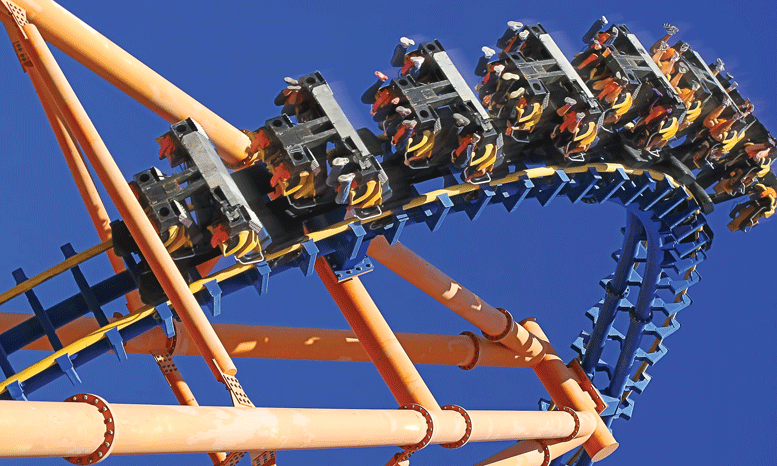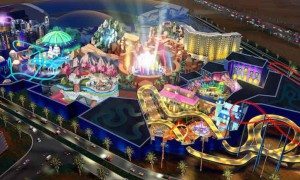Riding high: The UAE’s new raft of theme park developments
Big Project ME looks at the scope and potential of the UAE’s leisure and entertainment sector

Over the last decade, the UAE has developed itself into a global hub for tourism, with visitors attracted to the Emirates’ retail offerings, high-class hotels, year-round sunshine and good weather. The country offers tourists a wealth of experiences, from exotic desert getaways to cultural highlights such as the Sheikh Zayed Grand Mosque in Abu Dhabi. Sandwiched in between are high-end luxury offerings such as the Burj Al Arab and Burj Khalifa, which offer visitors a taste of the finer things in life.
However, like any tourism-based economy, there is a danger of becoming stagnant, leading crowds to dwindle as they look to alternative destinations that offer greater thrills and excitement. As such, it becomes necessary to regenerate and evolve to continue being relevant in a rapidly changing marketplace.
According to a 2015 PwC report entitled UAE’s Transformation into a World-Class Leisure and Entertainment Destination, the country needs to “once again step up if it is to go on to new heights to become a world-class leisure and entertainment destination that can rival Orlando, the current market leader”.
Therefore, it’s interesting to note that the UAE government has set the stage for large-scale public and private investment in tourism enablers (airports, hotels, transport infrastructure, new attractions and theme parks). This is expected to provide a strong base for an expected doubling of tourist arrivals over the next five to six years to more than 30 million visitors, the PwC report says.
However, to ensure the long-term success of these projects, there needs to be a holistic approach to the UAE’s destination management, with a country-wide vision in place that encourages cooperation and partnership between all stakeholders.
Orlando, Florida is perhaps a good example for the UAE to follow, the report suggests. Known as the ‘Theme Park Capital of the World’, the city is home to Walt Disney World Resort, the Universal Orlando Resort and SeaWorld, among many others. It is estimated that the city’s tourist attractions drew more than 62 million visitors in 2014.
Given that a successful leisure and entertainment destination should have multiple offerings that appeal to a wide range of visitors, all within close proximity, the UAE seems to be well on the way. It already has the beaches, the shopping malls and the cultural activities. The next step is the development of good transport links that allow visitors to move freely and quickly between attractions.
The infrastructure needed to support this has already begun taking shape, with the Dubai Metro network already connecting the bulk of the emirate to its key offerings. Meanwhile, plans to link Abu Dhabi and Dubai through a rail link are also well underway, with the rest of the country set to follow. Furthermore, the UAE’s well established road networks allow visitors to move quickly between emirates, allowing them to sample the various offerings from the different cities within a few days.
The next step is to develop the theme park destinations that will bring visitors from all around the world to the UAE. And here again, significant steps have already been made, with the Dubai Parks and Resorts project one notable example, says Philip Taylor, managing director of leisure consultancy practice Team-Leisure.
“The worldwide theme park design industry, with the UAE leading the way in the Middle East, has never been in better health,” he says. “The major role that theme parks can play as a destination driver are being increasingly recognised. This is especially true for branded attractions.”
Spread over 232,257sqm, the Dubai Parks and Resort project is set to open in October 2016 and will house three theme parks, one water park and a hotel and retail dining district. Among its attractions will be Legoland, a theme park made up of 60 million Lego bricks and 40 interactive rides in six themed areas; Motiongate, a theme park based on Hollywood films which will feature 27 rides and attractions; and Bollywood Parks Dubai.
The idea behind this massive $2.6 billion development is simple, says Klauss Assmann, vice president of Retail and Hospitality at Dubai Parks and Resorts. There simply wasn’t a similar offering in the market, and the developer spotted an opportunity.
“It’s the first time we’re introducing a theme park destination and not just a theme park into this region,” Assmann says in an interview released by Arabian Hotels Investment Conference. “We believe that if you look at the flight patterns of two, four and six hours away from Dubai, there are millions of people we can tap into.”
“We refer to a theme park as something that you can finish off within a day or half a day. A theme park destination, on the other hand, gives you an abundance of rides and attractions, and it can take you up to three or four days to finish.”
While Dubai Parks and Resorts may have been among the first to recognise the opportunity in the market, they certainly aren’t the only ones now. Last November, the Al Ahli Holding Group announced that it had agreed a deal to build a Fox-branded theme park and resort in Dubai, to open by 2018.
The UAE conglomerate says it has signed an international licensing partnership with Twentieth Century Fox Consumer Products, a division of Twenty-First Century Fox, to build a 371,612sqm theme park that will feature rides, attractions and retail outlets based on Fox productions such as Rio, Alien vs. Predator and The Simpsons. Design and production services on the theme park are being provided by California-based Rethink Leisure & Entertainment.
The upcoming project will be the second Twentieth Century Fox World theme park and the first Fox-branded resort. The deal with Al-Ahli will allow it to roll out up to three additional Fox-branded resorts in territories outside Dubai.
“20th Century Fox World, Dubai is the second Fox theme park destination and marks an important step forward in our global theme park strategy,” says Jeffrey Godsick, president of Twentieth Century Fox Consumer Products. “This park builds on the foundation being laid by 20th Century Fox World, Malaysia, currently under construction.”
This bears out Phil Taylor’s assertion that today’s successful theme parks are more likely than ever to be inspired by Hollywood characters and storylines. “There is a noticeable, ever-increasing trend towards the use of intellectual property-led attractions, both at an individual attraction level within theme parks and for whole parks,” he explains.
As more and more plans for theme park destinations get announced, it’s clear that the UAE’s shift in strategy is working, and numbers will only continue to grow, as figures released last year by Euromonitor International indicate.
Theme park revenues in the UAE are set to increase by 78% to $837 million by 2019, the report said, while a PwC expert adds that it is likely that the country will become a serious rival to theme park world leader Orlando by 2021.
“Globally, theme parks in Europe, the Far East and the USA, Orlando in particular, dominate the market. However, theme parks in the UAE have the potential to see over 18 million visits by 2021, versus Hong Kong’s 15 million,” says Philip Shepherd, Middle East Hospitality and Leisure Leader at PwC. “With its central global location and excellent hospitality facilities, we predict the UAE has the potential to become a serious rival to theme park world leader Orlando by 2021.”
As construction work continues in the UAE on other leisure projects beyond theme parks, such as two safari parks, the three upcoming museums on Abu Dhabi’s Saadiyat Island (Louvre Abu Dhabi, Guggenheim Abu Dhabi and Zayed National Museum) and the world’s longest indoor ski slope, it’s clear that this could very well be the case.
“This is arguably the most leisure development currently underway in one location in the world and is a huge undertaking. But if anywhere in the world has the resources, vision and power to pull it off, I believe it is the UAE,” Philip Taylor concludes.

























